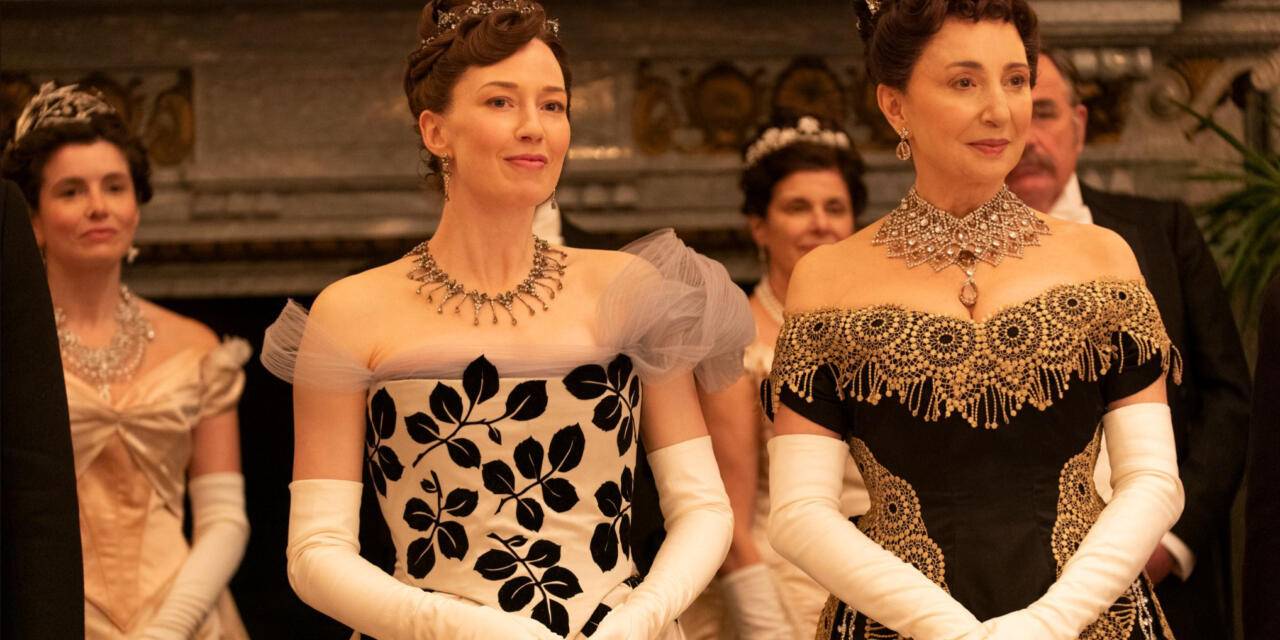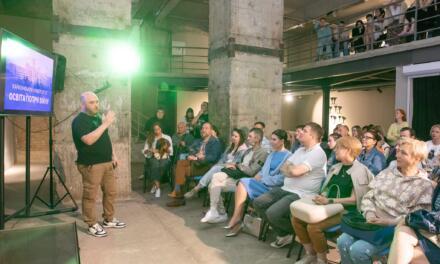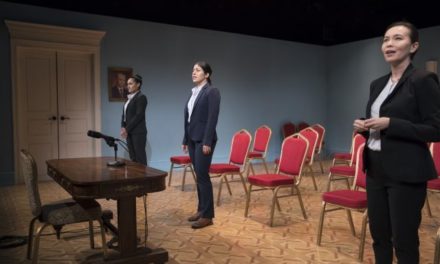American television and film director Michael Engler is extraordinarily skilled at both comedies and dramas. Before earning Emmy nominations for Sex and the City (HBO), 30 Rock (NBC), and Downton Abbey (PBS), Engler directed for the stage.
It is no surprise that the native of Evanston, Illinois is comfortable expressing ideas imaginatively. As an acting student at NYU Tisch School of the Arts, the renowned filmmaker and executive producer found himself enraptured by the concept of directing.
In late June, Engler and I met on a sunny morning at Think Coffee on the Bowery at the corner of Bleecker Street in downtown Manhattan to talk about craftsmanship and what he’s learned collaborating with ”Downton” and “Gilded Age” creator Julian Fellowes.
What’s more, the Yale School of Drama graduate tells The Theatre Times about what it was like working with fellow director, Salli Richardson-Whitfield on HBO’s period drama The Gilded Age.
“When I was at NYU, I was studying acting and that’s what I came to New York to do and I decided that I was only going to study someplace that I got in in New York. So I came to New York and was exposed to lots of theatre. And while I was there and I loved it and had some great teachers, people started saying to me: ‘You should be a director!’ ‘you should be a director!’ and I was mostly hurt by that because I interpreted that as ‘you’ll never be an actor’ or ‘you’re in your head or whatever.’ A friend of mine who was in my program and was an actor wrote his first play and said: ‘Would you direct this?’ And I said ‘okay’ and I kind of immediately felt that all of my interests in acting weren’t negated by that and all my other interests in architecture, art history, even my kind of my math brain worked well with staging and stuff and so it was really like one of those aha moments where the switch was flipped and I was like ‘oh I get it; I get it!’ I get why they all say that and from then on I just wanted to. So I finished my degree in acting,” explains Engler.
As to shooting and directing, Engler addresses the captivating appeal of the performing arts as a mode through which to explore craftsmanship.
“I value craft so highly. I really do and I think the performance part of it for me is finding the exact style for a piece, which means the exact balance between style and realism. I think a lot of people think of those or talk about those two things like they are in opposition and in a way they are. But I think mostly they heighten each other when crafted carefully. That when you are doing something in a period or a style the more real it feels the more convincing I think it is. You start to think ‘oh, oh right’ and you start to relate to it more. And I think sometimes the more you can heighten some reality in a particular style. The more universal it can become. It’s not less real. It’s just selected aspects of reality. And so, for me, it’s really just about learning about people and psychology and how to move that forward you know? In life, In performance, and how to use that to serve to create a believable world. So craft can be everything from understanding how people move. What they were taught. What they were wearing. What they knew. What they didn’t know. And then just the things we all know about people or learn about people about what drives them and how are they making choices moment to moment.”
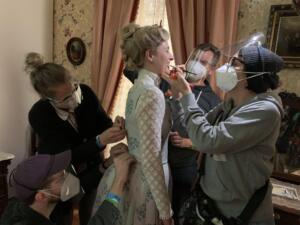
Louisa Jacobson on the set of HBO’s The Gilded Age during COVID. Photo by Michael Engler.
With a genuine appreciation of the fine arts, Engler touches on the creative process, spotlighting the difference surrounding big-screen cinema and the episodic format.
“Well, the thing is in the episodic format you are dealing with storylines that are being outlined over time. And then you are also dealing with scripts that are coming in one at a time. And so, you need to be thinking along the story questions because you know that if you don’t in some way lay the groundwork for the things that are coming up they can seem like they come out of nowhere when they do. And so, we talk a lot about whether are we setting things up enough. Are we laying it in too much. That it is going to be not a surprise when it gets there? So, we talk a lot about those things. And then we also talk a lot about, especially with these period pieces, the production and the pre-production element. It takes so long just to plan and build the sets or the costumes for a big event takes months and months and months so even if the script isn’t written, we need to know some of the basic outlines so we can start planning the physical production of what’s coming up before we have a script for it. So the big opening at the Metropolitan Opera in 1883 in New York is a thing in season two and that’s in the final episode and so we needed to figure out a way where we could get there by the end and be ready for this enormous thing. But also, we said along the way ‘Are we going to need to see it being built?’ A lot of those very practical things and creative decisions are the moment-by-moment being figured out while the long-term skeleton of things is being figured out because there are certain things we need to know in advance and certain things we don’t need to know. Those costumes each one of them takes eight to ten weeks from its first fitting really. So nothing can happen at the last minute,” said Engler.
Distinguished by a unique ability to bring a moment of American or British history to life in motion pictures, Engler speaks of the new tools that he is using including Computer-Generated Imagery (CGI) and what he has learned.
“Well definitely the visual effects—the CGI technology is enormous and we couldn’t do any of what we do without it. Part of what we want to do is get inside the intimacy of the world, but also show the scale of New York in the 1880s for instance, or London in the 1920s. And so what I’ve learned mostly is how to take what exists and build on it. Because creating from scratch is a thing we can do; we have a back lot that is built from scratch. But most of what we do is take elements or buildings or streets that exist and then shoot them in such a way so that later we change all the parts of it that aren’t correct to the period and add or subtract. And so what I would say I am learning is what’s worth it. How much work it takes? How much money does it take? And in terms of the effects when it’s worth it and when it’s just spinning wheels to make something big. I think too much can make it less convincing actually. Like if you examine it too carefully for too long you’ll start to notice the artificiality of it compared to what’s real on screen. And so you have to find the right rhythm when you are using authentic things versus when you’re making things up so that the blend between the two seems more seamless.”
In the context of feature films for the big screen, Engler directed Fellowes’ 2018 The Chaperone and 2019 Downton Abbey starring Elizabeth McGovern, Michelle Dockery, Jim Carter, Hugh Bonneville, and Dame Maggie Smith.
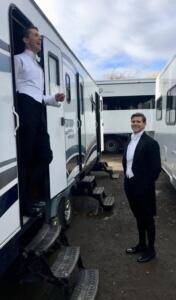
Matthew Goode and Allen Leech on the set of the Downton Abbey film. Photo courtesy: Michael Engler.
Although stylistically different, Downton Abbey and The Gilded Age appeal to a very wide range of demographics. Each work of art communicates its message against the background of social and intellectual forces that bring about growth and change. The scenes of high-society costume balls are especially effective because of the way Engler stages them.
Engler references a class and grace that resonates in one’s demeanor highlighting not only Julian Fellowes’ keen insight into humanity but also the social relevance evident in entertainment.
“One of the things he is interested in is the relationship between people in their time the position they were born into or find themselves in for various reasons how whatever the limitations are of that moment in time and that position. Whatever those limitations are for being black, a woman, poor, rich. Whatever opportunities it gives you are specific to that position. Whatever obstacles it has are specific to that time and place and position. To him, I think character has nothing to do with where you are born into that power structure. It has everything with how you deal with that at that moment. So people at the highest level can have absolutely no character and people at the lowest level can have absolute character. And vice versa and everything in between along the way and it’s how you take where you are and build a meaningful life of whatever success is to you based on your own values your own character is what defines you.”
He continued, adding,
“You know the honor of Downton Abbey means as much to Lord Robert Crawley as it does to the head butler. One runs the upstairs, the other downstairs. Each of them is equally invested. And for them, their definition of their own success is bringing honor to the house in every way that they can. And so they’re partners in that. He doesn’t judge one or the other as more honorable.”
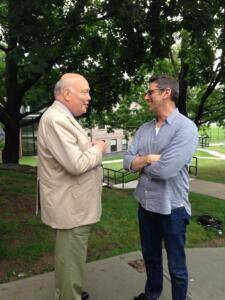
Julian Fellowes, the Academy Award winner for best original screenplay, Gosford Park, and Michael Engler on the set of The Chaperone
Engler exchanges views on what it was like working with fellow director, Salli Richardson-Whitfield in HBO’s “The Gilded Age.” The acclaimed TV series stars Denée Benton, Carrie Coon, Louisa Jacobson, Cynthia Nixon, Morgan Spector, and Christine Baranski as aristocrat Agnes van Rhijn who reigns over an established order.
“Well, it was fantastic working with Salli. I adore her. She is a completely original director with her own voice. She comes from a long successful career in acting and got into directing from television and film acting. And so, I think that her background and as an African-American woman, her interests brought so much balance to how we told the stories of the black and white worlds intersecting. And what the reality of that would have been. She heightened that a lot. She brought a lot of specificity to it. As well as bringing real life and breath and reality to the world of African-Americans of the upper middle class of the period,” said Engler.
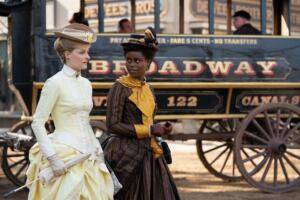
Louisa Jacobson and Denée Benton in The Gilded Age. The historical drama won a Primetime Creative Arts Emmy Award in 2022. Photo courtesy: HBO
He continued, adding,
“People said ‘Oh is she there to you know oversee the African-American stuff?’ But I have to say that her insights into the world of white people were as unique and special because she wasn’t from that you know? And so that’s the thing about bringing in new voices—they don’t just bring insight into their world; they bring insight into your world because they are not part of that. And you know that I feel the same way because people said to me ‘How was it being on set on ‘Downton Abbey?’ Did they accept you as the only American director to work on that? And I was so worried about that at first and then instantly it felt like they embraced me and not just because they are open-minded people, which they are but because I discovered that I was bringing something to it coming from the outside. I didn’t have all the same assumptions about growing up in that English system. So I think there were times when I would say for sure Salli just kind of reminded us ‘Oh here’s another way of looking at what that might have been like if you weren’t in you know the majority society back then.”
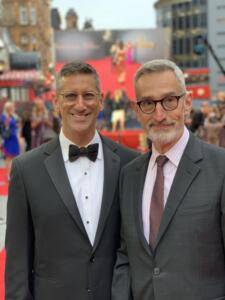
Michael Engler with husband Steve Sumser at the London premiere of the film, Downton Abbey
Regarding cultured interests such as the creative arts, Engler offers excellent advice to young directors and actors.
“Just keep going, you know? What I would say about myself and most of the people I know is that there are a few people who get really lucky. And get going fast in a way that they can pay their rent and pay their bills and all that. But for most of us, there are more reasons to quit along the way than to keep going. And I think I would just say that it’s important to know that. And know that it’s not you; It’s not personal. And if you are getting encouragement from anybody you should listen to that. I was getting encouragement from really wonderful people that I admired and respected. So the fact that I didn’t get a lot of jobs that I wanted or get into places that I wanted to get into or be considered for certain things. I thought, well, okay. These people want me around and believe in me then I belong there you know? And I’ll just figure out my way up. If I can’t do that I’ll do this. If I can’t direct, I’ll assist. If I can’t direct, I’ll stage manage. And I think something you can say to people is ‘this is what I want to do. If I’m not ready for that in your eyes, how can I help? What can I do?’ And they start to see what you bring to something and that even if you are not ready, you are on your way and they want to help you.”
With a unique focus on the performing arts, Michael Engler stands acknowledged as one of the world’s most talented directors.
This post was written by the author in their personal capacity.The opinions expressed in this article are the author’s own and do not reflect the view of The Theatre Times, their staff or collaborators.
This post was written by Alexander Fatouros.
The views expressed here belong to the author and do not necessarily reflect our views and opinions.

